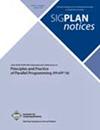有限期望:概率程序的资源分析
Q1 Computer Science
引用次数: 82
摘要
本文提出了一种新的静态分析方法,用于推导概率规划期望资源消耗的上界。分析是完全自动的,并在输入中导出多元多项式的符号边界。新技术结合了概率程序的人工最先进的推理技术和确定性程序的自动资源约束分析的有效方法。它既可以看作是自动平摊资源分析(AARA)对概率程序的扩展,也可以看作是基于最弱前提条件的概率程序的人工推理的自动化。该技术的一个优点是它结合了最弱前提演算的清晰度和组合性以及AARA的高效自动化。因此,在许多情况下,边界推理可以简化为现成的LP求解,如果自动化失败,可以使用标准程序逻辑交互式地扩展自动派生的边界。在现有工作的基础上,对基于马尔可夫决策过程的操作语义证明了分析的合理性。该技术的有效性通过一个原型实现来证明,该原型实现用于自动分析39个具有挑战性的概率程序和随机算法。实验表明,所得的边界常数因子是非常精确的,甚至对某些程序是最优的。本文章由计算机程序翻译,如有差异,请以英文原文为准。
Bounded expectations: resource analysis for probabilistic programs
This paper presents a new static analysis for deriving upper bounds on the expected resource consumption of probabilistic programs. The analysis is fully automatic and derives symbolic bounds that are multivariate polynomials in the inputs. The new technique combines manual state-of-the-art reasoning techniques for probabilistic programs with an effective method for automatic resource-bound analysis of deterministic programs. It can be seen as both, an extension of automatic amortized resource analysis (AARA) to probabilistic programs and an automation of manual reasoning for probabilistic programs that is based on weakest preconditions. An advantage of the technique is that it combines the clarity and compositionality of a weakest-precondition calculus with the efficient automation of AARA. As a result, bound inference can be reduced to off-the-shelf LP solving in many cases and automatically-derived bounds can be interactively extended with standard program logics if the automation fails. Building on existing work, the soundness of the analysis is proved with respect to an operational semantics that is based on Markov decision processes. The effectiveness of the technique is demonstrated with a prototype implementation that is used to automatically analyze 39 challenging probabilistic programs and randomized algorithms. Experiments indicate that the derived constant factors in the bounds are very precise and even optimal for some programs.
求助全文
通过发布文献求助,成功后即可免费获取论文全文。
去求助
来源期刊

ACM Sigplan Notices
工程技术-计算机:软件工程
CiteScore
4.90
自引率
0.00%
发文量
0
审稿时长
2-4 weeks
期刊介绍:
The ACM Special Interest Group on Programming Languages explores programming language concepts and tools, focusing on design, implementation, practice, and theory. Its members are programming language developers, educators, implementers, researchers, theoreticians, and users. SIGPLAN sponsors several major annual conferences, including the Symposium on Principles of Programming Languages (POPL), the Symposium on Principles and Practice of Parallel Programming (PPoPP), the Conference on Programming Language Design and Implementation (PLDI), the International Conference on Functional Programming (ICFP), the International Conference on Object-Oriented Programming, Systems, Languages, and Applications (OOPSLA), as well as more than a dozen other events of either smaller size or in-cooperation with other SIGs. The monthly "ACM SIGPLAN Notices" publishes proceedings of selected sponsored events and an annual report on SIGPLAN activities. Members receive discounts on conference registrations and free access to ACM SIGPLAN publications in the ACM Digital Library. SIGPLAN recognizes significant research and service contributions of individuals with a variety of awards, supports current members through the Professional Activities Committee, and encourages future programming language enthusiasts with frequent Programming Languages Mentoring Workshops (PLMW).
 求助内容:
求助内容: 应助结果提醒方式:
应助结果提醒方式:


